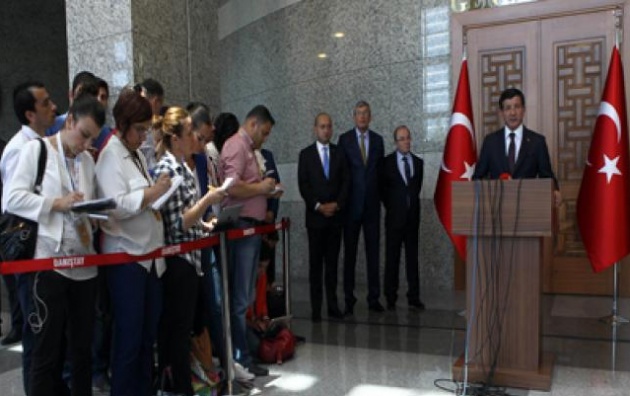
Turkey on Friday launched a second wave of raids against Islamic State (IS) jihadists in Syria and embarked on a new campaign to bombard camps of Kurdish militants in northern Iraq.
Turkish F-16s took off from their base in the southeastern city of Diyarbakir to carry out a new wave of strikes against IS after a first set of attacks earlier in the day, the CNN-Turk and NTV television channels reported.
The raids marked a major shift in policy towards IS by key NATO member Turkey, which has faced severe criticism from its Western allies for not doing enough to combat the jihadists.
But on this occasion planes also bombed positions of the Kurdistan Workers Party (PKK) in neighbouring Iraq, where the group’s military forces are based.
“At around 11:00 pm (2000 GMT) tonight, Turkish warplanes started bombing our positions near the border, accompanied by heavy artillery shelling,” PKK spokesman in Iraq Bakhtiar Dogan told AFP.
He said the strikes targeted mountain positions in the north of the Dohuk province, which is part of Iraq’s northern autonomous region of Kurdistan.
Dogan also said that jets had flown over the Qandil mountains, an area north of the Iraqi Kurdish capital Arbil which the PKK’s political leadership has been using as a safe haven, but had not conducted any strikes there.
There was no confirmation of the PKK raids from the Turkish government.
Prime Minister Ahmet Davutoglu said that the first bombing operation early Friday against IS had “100 percent” achieved its goals.
The air raids were ordered in the wake of a suicide bombing blamed on IS that killed 32 activists on the Syrian border on Monday and cross-border clashes Thursday that claimed the life of a Turkish soldier.
The Britain-based Syrian Observatory for Human Rights monitoring group said nine IS fighters were killed in the first attacks and 12 wounded.
Those raids bombed three targets controlled by Islamic State (IS) jihadists up to 14 kilometres (8.7 miles) inside Syrian territory, the official Anatolia news agency reported.
“Turkey will show the strongest reaction to the slightest movement that threatens it,” Davutoglu said.
“The operation against IS reached its target and will not stop,” he added.
President Recep Tayyip Erdogan said in televised comments that the security situation had “got out of control” in the last days and Turkey had to act differently now.
Nearly 300 suspects held
The fighting erupted after the killing of 32 people in a suicide bombing Monday in the Turkish town of Suruc on the Syrian border carried out by a 20-year old Turkish man linked to IS.
The attack, which targeted Turkish activists preparing an aid mission in Syria, sparked an upsurge in violence in Turkey’s Kurdish-dominated southeast, where many accuse Turkish authorities of collaborating with IS.
In an apparent bid to crack down on all sources of violence, Turkish police on Friday swooped on suspected members of the IS group and the PKK, which has waged a separatist insurgency against the government in the southeast for decades.
A total of 297 people including 37 foreigners were detained, Davutoglu said, adding that the raids took place in 16 provinces across Turkey.
As well as IS and the PKK, the operation targeted suspected members of the PKK’s youth wing, The Patriotic Revolutionary Youth Movement (YDG-H), and the Marxist Revolutionary People’s Liberation Party Front (DHKP-C).
Among those arrested in Istanbul was a senior local IS figure, Halis Bayancuk, who has the nom de guerre of Ebu Hanzala, the official Anatolia news agency said.
A female member of the DHKP-C was killed in Istanbul in clashes with police during the raids, Turkish media said. The Hurriyet daily reported she had been readying a suicide bombing.
Two police were shot dead in southeast Turkey close to the Syrian border on Wednesday, in an attack claimed by the PKK’s military wing which said it wanted to avenge the Suruc bombing.
On Thursday, another policeman was killed in the majority Kurdish city of Diyarbakir.
With tensions running high across the country, Turkish police used tear gas and rubber bullets to disperse a protest in the Istanbul district of Kadikoy by hundreds of people to denounce IS violence.
In the anti-establishment district of Gazi, protesters threw Molotov cocktails and engaged in pitched battles with police, an AFP photographer said.
‘Deal on air base’
Turkey has been accused of colluding with IS extremists in the hope they might further Ankara’s aim of toppling Syrian President Bashar al-Assad.
Ankara has always vehemently denied the claims but the NATO member has dodged playing a full role in the US-led coalition assisting Kurds fighting IS militants.
Now, however, Ankara has finally given the green light to US forces for the use of its Incirlik base for air strikes against IS in Syria and Iraq, American officials said Thursday.
“A decision has been taken for Turkey’s own security,” Davutoglu added, declining to give details on the agreement.
Hurriyet said the agreement provided for the establishment of a 90-kilometre (56 mile) no-fly zone between the Syrian towns of Marea and Jarabulus to the east.



